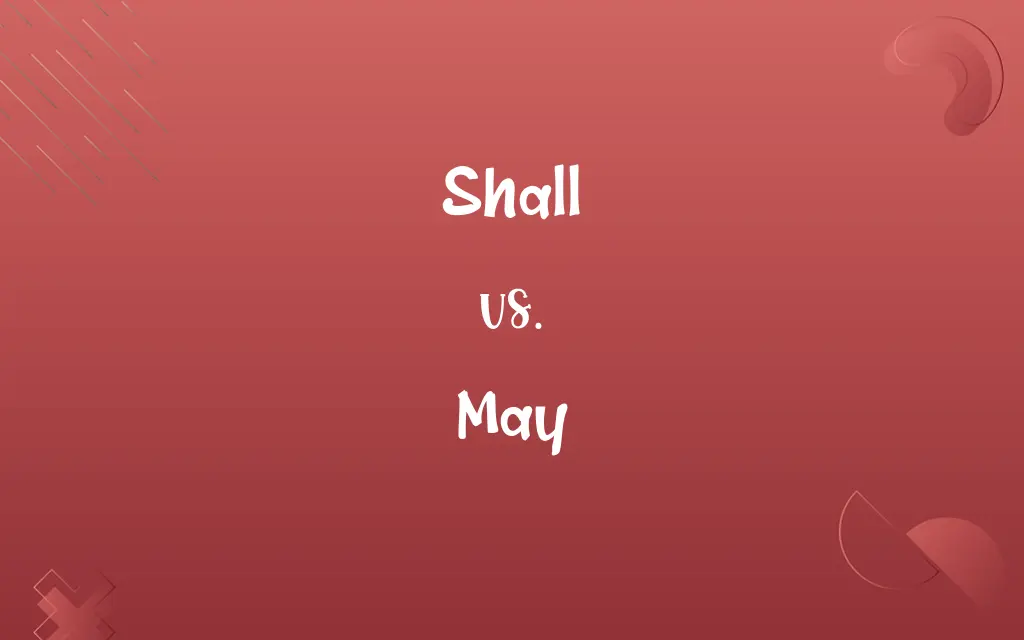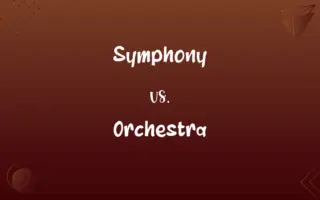Shall vs. May: Know the Difference

By Shumaila Saeed || Published on February 4, 2024
"Shall" often implies obligation or requirement, while "May" suggests permission or possibility.

Key Differences
"Shall" is primarily used to express a strong assertion or intention, especially in formal contexts. It indicates a future action that is determined or obligatory. In contrast, "May" is used to express permission, possibility, or a hypothetical scenario. It suggests a less definite action that is subject to approval or certain conditions.
Shumaila Saeed
Feb 04, 2024
In legal and formal documents, "Shall" is frequently employed to denote mandatory actions or duties, reflecting a sense of command or compulsion. "May", in these contexts, is used to grant permission or indicate options available within the framework of the rules or law.
Shumaila Saeed
Feb 04, 2024
"Shall" can also be used to offer suggestions or promises in a formal tone, often in a future context. However, "May" leans towards a more polite or formal expression of hope or wish, especially when discussing future events.
Shumaila Saeed
Feb 04, 2024
In questions, "Shall" is often used to seek advice or a decision, particularly in British English. On the other hand, "May" in questions is commonly used to request permission or inquire about the feasibility of an action.
Shumaila Saeed
Feb 04, 2024
The usage of "Shall" can vary between British and American English, where it's more formal in the latter. "May", however, maintains a consistent usage across both dialects as a polite and formal way of expressing possibility or seeking permission.
Shumaila Saeed
Feb 04, 2024
ADVERTISEMENT
Comparison Chart
Function
Expresses obligation or intention
Indicates permission or possibility
Shumaila Saeed
Feb 04, 2024
Context
Common in legal, mandatory directives
Used for granting permission, options
Shumaila Saeed
Feb 04, 2024
Question Form
Seeks advice or decision (more in British English)
Requests permission or feasibility
Shumaila Saeed
Feb 04, 2024
Variation in English
More formal in American English
Consistent usage in both British and American English
Shumaila Saeed
Feb 04, 2024
ADVERTISEMENT
Example Sentence
"You shall complete the report by Monday."
"You may leave early if you finish the task."
Shumaila Saeed
Feb 04, 2024
Shall and May Definitions
May
Permission or allowance:
You may go to the party after finishing your work.
Shumaila Saeed
Jan 21, 2024
ADVERTISEMENT
Shall
In legal context, a mandatory requirement:
The tenant shall pay rent on the first of each month.
Shumaila Saeed
Jan 21, 2024
Shall
Used before a verb to indicate the simple future tense in the first person singular or plural.
I shall sing in the choir tomorrow.
I hope that we shall win the game.
Shumaila Saeed
Jan 20, 2024
May
The fifth month of the year in the Gregorian calendar. See Table at calendar.
Shumaila Saeed
Jan 20, 2024
Shall
Used similarly to indicate determination or obligation in the second and third persons singular or plural.
(determination): You shall go to the ball!
(obligation): Citizens shall provide proof of identity.
Shumaila Saeed
Jan 20, 2024
Shall
Used in questions with the first person singular or plural to suggest a possible future action.
Shall I help you with that?
Shall we go out later?
Let us examine that, shall we?
Shumaila Saeed
Jan 20, 2024
May
To have permission to, be allowed. Used in granting permission and in questions to make polite requests.
You may smoke outside;
May I sit there?
Shumaila Saeed
Jan 20, 2024
May
Expressing a present possibility; possibly.
He may be lying;
Schrödinger's cat may or may not be in the box
Shumaila Saeed
Jan 20, 2024
May
Expressing a wish (with present subjunctive effect).
May you win;
May the weather be sunny
Shumaila Saeed
Jan 20, 2024
May
Used in modesty, courtesy, or concession, or to soften a question or remark.
Shumaila Saeed
Jan 20, 2024
May
An auxiliary verb qualifying the meaning of another verb,
How may a man, said he, with idle speech,Be won to spoil the castle of his health!
For what he [the king] may do is of two kinds; what he may do as just, and what he may do as possible.
For of all sad words of tongue or penThe saddest are these: "It might have been."
Shumaila Saeed
Jan 20, 2024
May
Contingency or liability; possibility or probability.
Though what he learns he speaks, and may advanceSome general maxims, or be right by chance.
Shumaila Saeed
Jan 20, 2024
May
Modesty, courtesy, or concession, or a desire to soften a question or remark.
How old may Phillis be, you ask.
Shumaila Saeed
Jan 20, 2024
May
The early part or springtime of life.
His May of youth, and bloom of lustihood.
Shumaila Saeed
Jan 20, 2024
May
The flowers of the hawthorn; - so called from their time of blossoming; also, the hawthorn.
The palm and may make country houses gay.
Plumes that mocked the may.
Shumaila Saeed
Jan 20, 2024
May
Thorny Eurasian shrub of small tree having dense clusters of white to scarlet flowers followed by deep red berries; established as an escape in eastern North America
Shumaila Saeed
Jan 20, 2024
Repeatedly Asked Queries
Can "may" be used to offer a suggestion?
"May" is less common for suggestions; it's more about permission.
Shumaila Saeed
Feb 04, 2024
Can "may" imply uncertainty?
Yes, "may" often indicates a possibility or uncertainty.
Shumaila Saeed
Feb 04, 2024
Is "shall" still common in everyday speech?
"Shall" is less common in casual conversation, more formal.
Shumaila Saeed
Feb 04, 2024
Can "may" be used in place of "might"?
"May" and "might" are often interchangeable, but "may" is slightly more certain.
Shumaila Saeed
Feb 04, 2024
Is "shall" used for future predictions?
"Shall" is more about intent or obligation than prediction.
Shumaila Saeed
Feb 04, 2024
Is "shall" obligatory in legal texts?
In legal texts, "shall" usually indicates a requirement.
Shumaila Saeed
Feb 04, 2024
How is "may" used in questions?
"May" in questions typically seeks permission.
Shumaila Saeed
Feb 04, 2024
Can "shall" be used to make an offer?
"Shall" can be used in offers, especially in questions like "Shall we...?"
Shumaila Saeed
Feb 04, 2024
Is "shall" common in contracts?
Yes, "shall" is commonly used in legal and contractual language.
Shumaila Saeed
Feb 04, 2024
Is "may" appropriate in formal requests?
Yes, "may" is polite and appropriate in formal requests.
Shumaila Saeed
Feb 04, 2024
Does "may" have different meanings in different contexts?
Yes, "may" can mean permission, possibility, or a wish depending on context.
Shumaila Saeed
Feb 04, 2024
Does "shall" vary in use between British and American English?
Yes, "shall" is more formal in American English.
Shumaila Saeed
Feb 04, 2024
Can "may" be used to express a wish?
Yes, "may" is used in expressions like "May you be happy."
Shumaila Saeed
Feb 04, 2024
Is "shall" more definite than "will"?
"Shall" implies obligation or determination, while "will" is more about the future.
Shumaila Saeed
Feb 04, 2024
Is "shall" appropriate for polite suggestions?
"Shall" can be formal and less casual for suggestions.
Shumaila Saeed
Feb 04, 2024
Does "may" always indicate permission?
Primarily, but it can also suggest possibility.
Shumaila Saeed
Feb 04, 2024
Can "may" indicate a future event?
Yes, "may" can suggest possible future events.
Shumaila Saeed
Feb 04, 2024
Is "shall" used in modern legal documents?
Yes, it's still used for its formal, obligatory tone.
Shumaila Saeed
Feb 04, 2024
Can "shall" be replaced with "will"?
Often, but "shall" has a more formal, obligatory connotation.
Shumaila Saeed
Feb 04, 2024
Is "may" used differently in British and American English?
"May" has similar usage in both dialects.
Shumaila Saeed
Feb 04, 2024
Share this page
Link for your blog / website
HTML
Link to share via messenger
About Author
Written by
Shumaila SaeedShumaila Saeed, an expert content creator with 6 years of experience, specializes in distilling complex topics into easily digestible comparisons, shining a light on the nuances that both inform and educate readers with clarity and accuracy.









































































